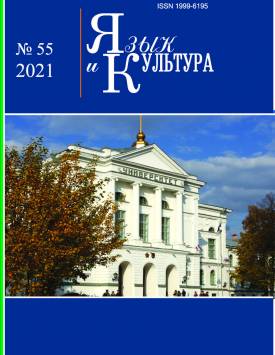Unsteady phonetic variability of anglicisms in oral Russian (sociophonetic experimental research)
The article presents sociophonetic experimental data on the problem of assimilation of newly-borrowed words from English into modern Russian. The research was due to the need to assess the spontaneous processes and consequences of the interaction between English and Russian linguocultures in the XXI-st century. The authors' analysis of the features in a particular sphere of the field is accomplished on the basis of the concept of auditory identity between the phonetic patterns of the borrowed lexical unit (anglicism) and its donor-language prototype. A classification of phonetic types and kinds of anglicisms in modern spoken Russian is suggested - nuclear-iconic type (maximum degree of auditory identity, e.g. 'primaries 'праймериз, pro'motion про'моушн, 'highly 'likely 'хайли 'лайкли), near-nuclear- iconic type (high degree of auditory identity with interspersed modifications of sound or/and accentual structure of the anglocism, e.g. badge бейдж, бедж; 'lockdown лок'даун, 'carsharing кар Шеринг), peripheral-iconic type (medium-to high degree of auditory identity, with a derived anglicism's structure composed of the prototype' s root in cooperation with Russian components, e.g. use 'юзать, google про'гуглить, 'photoshop подфо то Шопить). The main object of the analysis is tendencies of word stress variability of anglicisms in spoken Russian - a prosodic section with clearest indications of unsteady variability of place and character of stress in them. The main subject of the analysis is the trends of localization of syllabic prominence in the borrowed neologisms of the recipient language - the prosodic sector with the most striking indicators of unstable variation of the place and nature of stress in anglicisms. The conditions of both hearing perception in natural and experimental formats, and reproduction of borrowed lexical units aloud are taken into account. On the example of such neologisms as COVID ковид, COVID-19 ковид-19, et al there was re vealed a peculiarity of the unsteady phonetic variability of anglicisms in the Russian language oral usage. Taking into account the influence of a complex of extralinguistic factors - the degree of formality of the speech act, the degree of activity of the use of English by the speaker, the sphere of the latter's activities, his/her gender, etc. was of great help. A common trend-forming feature was found out - the desire for complete phonetic assimilation of borrowed neologisms in oral Russian, in particular the tendency to shift the initial localization of syllabic prominence in the word to the right, e.g. 'COVid ко'ВИД, 'MARketing мар'КЕтинг, 'INfluencer инфлю'ЕНсер).
Keywords
Accentual structure, Anglicism, Anglo-Russian parallels, auditory identity, borrowing, prototype, stress, variabilityAuthors
| Name | Organization | |
| Dubovsky Yu.A. | Pyatigorsk State University | dubovsky@pgu.ru |
| Zagrayevskaya T.B. | Pyatigorsk State University | zagraevskaya@yandex.ru |
References

Unsteady phonetic variability of anglicisms in oral Russian (sociophonetic experimental research) | Yazyk i Kultura – Language and Culture. 2021. № 55. DOI: 10.17223/19996195/55/3
